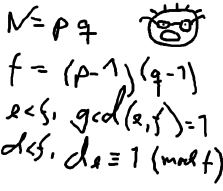POJ 2635 The Embarrassed Cryptographer
来源:互联网 发布:彩票计划软件源码 编辑:程序博客网 时间:2024/05/16 05:41
Description
 The young and very promising cryptographer Odd Even has implemented the security module of a large system with thousands of users, which is now in use in his company. The cryptographic keys are created from the product of two primes, and are believed to be secure because there is no known method for factoring such a product effectively.
The young and very promising cryptographer Odd Even has implemented the security module of a large system with thousands of users, which is now in use in his company. The cryptographic keys are created from the product of two primes, and are believed to be secure because there is no known method for factoring such a product effectively. What Odd Even did not think of, was that both factors in a key should be large, not just their product. It is now possible that some of the users of the system have weak keys. In a desperate attempt not to be fired, Odd Even secretly goes through all the users keys, to check if they are strong enough. He uses his very poweful Atari, and is especially careful when checking his boss' key.
Input
The input consists of no more than 20 test cases. Each test case is a line with the integers 4 <= K <= 10100 and 2 <= L <= 106. K is the key itself, a product of two primes. L is the wanted minimum size of the factors in the key. The input set is terminated by a case where K = 0 and L = 0.
Output
For each number K, if one of its factors are strictly less than the required L, your program should output "BAD p", where p is the smallest factor in K. Otherwise, it should output "GOOD". Cases should be separated by a line-break.
Sample Input
143 10143 20667 20667 302573 302573 400 0
Sample Output
GOODBAD 11GOODBAD 23GOODBAD 31
这题的大意是给你两个数K,L,K是两个质数的乘积,问两个质数中是否有一个比L小的,如果没有,输出GOOD;如果有,输出BAD 那个质数。
求123是否能被3整除,只需要求123%3是否为0
但是这题里的K特别大,不能直接取模,所以就利用了同余模定理
如果123是一个非常大的数,想知道123%3的值是多少,可以这么搞:
1%3 = 1;
(1*10 + 2)%3 = 0;
(0*10 + 3)%3 = 0;
就算出123%3的值是0了
10进制的时候是这个样子,同理1000进制也是一样的,把大数分为3个一段,把*10改成*1000就可以了
#include<cstdio>#include<cstring>#include<iostream>#include<algorithm>using namespace std;int p[1000010];int flag[1000010];int c;void prime(){ long long i,j; memset(flag,0,sizeof(flag)); flag[1]=1; c = 0; for(i=2;i<1000010;i++) { if(flag[i]) continue; p[c++] = i; for(j=i*i;j<1000010;j+=i) { flag[j] = 1; } }}int main(void){ prime(); int i,j,m,l; char a[110]; int da[110]; while(scanf("%s%d",a,&l)==2) { if(a[0]=='0' && l == 0) break; int k = 0; int len = strlen(a); int sum = 0; int f = 0; for(i=len-1;i>=0;i--) { int temp = a[i]-'0'; for(j=1;j<=f;j++) temp*=10; sum += temp; f++; if(f==3) { da[k++] = sum; sum = 0; f = 0; } } if(sum!=0) da[k++]=sum; int mark = -1; for(i=0;i<c&&l>p[i];i++) { int t = 0; for(j=k-1;j>=0;j--) { t = (t*1000 + da[j])% p[i]; } if(t == 0) { mark = p[i]; break; } } if(mark == -1) printf("GOOD\n"); else printf("BAD %d\n",mark); }} 0 0
- POJ 2635 The Embarrassed Cryptographer
- poj 2635 The Embarrassed Cryptographer
- POJ 2635 The Embarrassed Cryptographer
- POJ 2635 The Embarrassed Cryptographer
- POJ 2635 The Embarrassed Cryptographer
- poj-2635-The Embarrassed Cryptographer
- POJ 2635 The Embarrassed Cryptographer
- POJ 2635 The Embarrassed Cryptographer
- POJ 2635 The Embarrassed Cryptographer
- POJ 2635 The Embarrassed Cryptographer
- poj 2635 The Embarrassed Cryptographer
- POJ 2635 The Embarrassed Cryptographer
- POJ 2635 The Embarrassed Cryptographer
- 【POJ 2635】 The Embarrassed Cryptographer
- The Embarrassed Cryptographer(POJ--2635
- POJ-2635 The Embarrassed Cryptographer
- POJ 2635 The Embarrassed Cryptographer
- poj 2635 The Embarrassed Cryptographer
- HTML Audio/Video DOM timeupdate 事件,play()方法
- 字段位置上的sql语句
- 单链表的理解与使用及拓展
- UML图学习之一 用例图
- 【61】序列化二叉树
- POJ 2635 The Embarrassed Cryptographer
- 存个图片。。。
- UIViewController的几种跳转模式及其应用
- UML图学习之二 类图
- POJ2549-Sumsets
- C++之string类型详解
- UML图学习之三 状态图
- UML图学习之四 活动图
- UVALive 7278 Game of Cards


